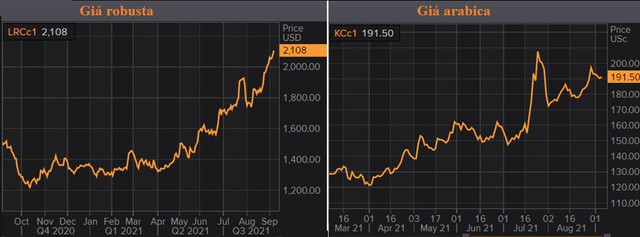Recently, concerns about the global shortage of coffee have increased after the re-emergence of the Covid-19 epidemic, which halted operations in Vietnam, leading to supply chain disruptions for this product. , pushing prices up.
Robusta coffee prices on the London floor are currently at the highest level in more than 4 years, with the reference futures contract on September 7 reaching $2,123; arabica is also close to touching 2 USD, reaching 1,9395 USD/lb.
Ho Chi Minh City, home to the main seaport and also a major export hub, has been locked down for weeks to prevent the spread of the Delta variant virus, making it extremely difficult for exporters. in transporting coffee to seaports for export to the world. In the context that coffee prices have previously increased sharply due to bad weather in Brazil, the delay in exporting coffee from Vietnam threatens to make this commodity increase sharply.
Carlos Mera, an analyst at Rabobank, told the Financial Times: “It is very worrying because (the exporter) cannot ship coffee to the world”.
Coffee warehouses in Ho Chi Minh City and neighboring provinces due to the extension of the distance order under Directive 16 to the end of September 15, 2021, so it is likely that the coffee market will have to wait until the end of September 2021. Coffee in the country has just returned to normal.
Coffee exports in August 2021 were estimated at 105 thousand tons, worth 207 million USD, down 14.1% in volume and 11.9% in value compared to July 2021, but compared to August. 2020 will increase by 4.8% in volume and 12.3% in value. Generally, in the first 8 months of 2021, coffee exports are estimated at 1.07 million tons, worth 1.99 billion USD, down 6.9% in volume, but up 1.1% in value over the same period last year. 2020.
Vietnam is the world’s second-largest coffee producer and a key producer and exporter of robusta, a bitter-tasting coffee bean used primarily in instant coffee and some coffees. espresso. Vietnam’s coffee exports are affected, affecting the global supply of coffee.

Coffee prices increased sharply (Source: Refinitif)
The Vietnam Coffee-Cocoa Association has petitioned the Government to grant travel permits to its members to perform urgent tasks during the time of social distancing, to facilitate export activities. avoid the exporter having to compensate the customer due to the delay in delivery. Transport Minister Nguyen Van The has directed the authorities to find solutions to facilitate the easier transportation of goods, including coffee and rice.
This year’s global supply of coffee has been threatened with a large reduction because the Brazilian coffee industry is going through a serious crisis with the risk of a sharp drop in Brazilian production due to drought and frost amid high prices. Due to the high growth rate, coffee exporters face many obstacles in hiring cargo ships and containers, causing businesses to fail to deliver on time and reduce cash flow, adversely affecting their finances.
Ibi Idoniboye, senior market analyst at Mintec, told The Guardian: “At the beginning of the coffee tree flowering season in Brazil this year – the fruit is harvested in the 2021-22 crop, currently harvesting. harvest – the weather is very dry, so the plants can’t flower much and set fruit incorrectly, making the yield being harvested is lower than usual.”
Coffee export turnover of this South American country in July 2021 reached more than 402.7 million USD, down 5.6% over the same period in 2020 due to logistics problems in the world maritime transport industry. According to Cecafe, Brazil’s coffee exports in the period from January to July 2021 reached more than 23.3 million bags with a value of $32. billion, only a slight increase of 2.2% and 7% respectively over the same period last year. prior to.
Over the weekend, Mato Grosso do Sul and other areas of central Brazil got some rain, helping to ease the dryness. However, the key coffee growing areas of Minas Gerais and Sao Paulo continue to suffer from a drought that has lasted for months.
The US Department of Agriculture (USDA) forecasts Brazilian coffee production in MY21/22 will decrease by 13.6 million bags to 56.3 million bags (1 bag = 60 kg), while domestic consumption is expected will continue to grow to a record 23.7 million bags. With supplies falling, coffee exports from the country are expected to drop by 9.0 million bags to 32.0 million and end-of-season stocks are forecast to fall by 2.5 million bags to 1.5 million bags. Of which, arabica production is forecast to decrease by 14.7 million bags year-on-year to 35.0 million bags due to a combination of factors. Most of the production areas are in the last year of the biennial production cycle, leading to the possibility of less output in the upcoming crop.
The Somar Meteorological Agency has predicted dry weather along with high temperatures in Brazil’s main coffee-growing regions to continue for the next two weeks. Besides, the recent frosts in this country will affect next year’s coffee crop.
Meanwhile, in Colombia, the world’s second-largest arabica exporter, clouds are also affecting the current crop, and the weather is expected to continue. The Covid-19 rapid blockade campaign in Vietnam has not ended yet. With the above factors, coffee price is forecasted to remain at a high level, possibly even increasing further in the short term.
References: Business Insider, invezz.com
